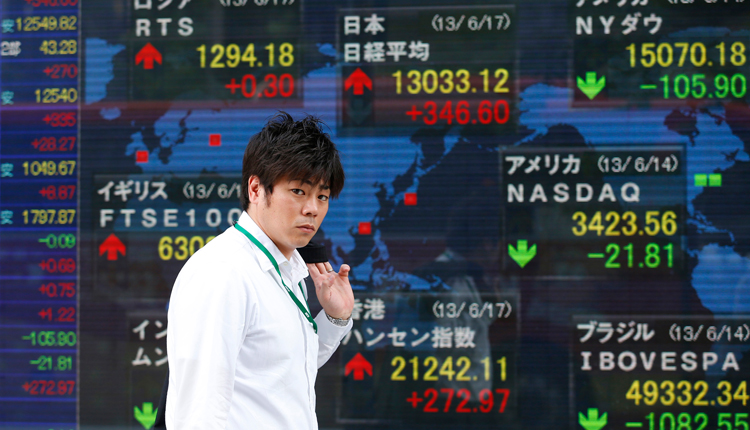Asian stocks closed higher on Thursday, with Japan leading gains in the region. That followed moves higher on Wall Street in the last session, which saw the Dow Jones industrial average close above 25,000.
The Nikkei 225 advanced 0.87 percent, or 197.53 points, to close at 22,823.26 as banking and other financial sector stocks advanced. Automakers were also broadly higher as the yen continued to trade near the 110 handle to the dollar.
South Korean stocks also gained, with the benchmark Kospi closing up 0.69 percent at 2,470.58. Banks and steelmakers climbed, with Posco rising 4.4 percent, but gains were capped by declines in large-cap technology stocks. Index heavyweight Samsung Electronics fell 1.36 percent, lagging the broader index.
Australia’s S&P/ASX 200 edged up by 0.53 percent to 6,057.30. Mining majors like Rio Tinto and BHP extended the last session’s gains, adding 2.33 percent and 2.07 percent, respectively. Utilities and gold producers finished lower.
Greater China markets ended the day mixed. Hong Kong’s Hang Seng Index tacked on 0.65 percent by 3:00 p.m. HK/SIN, driven by gains in heavily weighted financials. On the mainland, the Shanghai composite closed lower by 0.2 percent at 3,108.98 and the smaller Shenzhen composite declined 0.63 percent to 1,767.96.
MSCI’s broad index of shares in Asia Pacific excluding Japan rose 0.48 percent in afternoon trade.
Investors digested news overnight relating to the possibility of the European Central Bank’s asset purchasing program coming to an end after comments from the central bank’s chief economist, Peter Praet.
Underlying strength in the euro area economy was making the central bank confident that inflation will move toward target, Praet said on Wednesday, adding that the institution would next week discuss how it will wind down its 30 billion euro (about $35 billion) monthly-purchase program.
The euro got a boost from those remarks, adding to the last session’s gains and trading at $1.1806 at 2:57 p.m. HK/SIN.
Those comments also saw European bonds sold off overnight. U.S. Treasury yields also rose on Wednesday, with the benchmark ten-year Treasury note yield standing at 2.98 percent on Thursday. Bond yields move inversely to prices.
“The U.S. is towards the end of its cycle … China’s rebalancing so I don’t know whether you call that a cycle or whether it’s still just going to continue to grow at 5 or 6 percent, and Europe is very much mid-cycle. The world is not a uniform place anymore as it was last year in 2017,” Neil Dwane, global strategist at Allianz Global Investors, told CNBC’s “Squawk Box.”
The move higher in regional markets also tracked the sharp gains seen on Wall Street in the previous session.
The Dow rose 1.4 percent, or 346.41 points, to 25,146.39, marking its first close above the 25,000 level since mid-March. Boeing, which advanced 3.2 percent in the last session, contributed the most to the index’s overall gains.
Other major U.S. stock indexes also closed higher as bank stocks rose.
The improved sentiment in the session could have also be tied to recent trade tensions fading to the background ahead of the G-7 summit at the end of this week.
White House economic advisor Larry Kudlow, a former CNBC senior contributor, on Wednesday said President Donald Trump was trying to “fix” international trade, adding that the tensions were “disputes that need to be solved.”
“There will be more to this story over the next few trading sessions as we approach the G-7 and markets will react accordingly, but in general the stock indices are riding this particular wave of uncertainly fairly easily at the moment,” Nick Twidale, chief operating officer at Rakuten Securities Australia, said in a morning note.
On the energy front, U.S. West Texas Intermediate traded higher by 0.37 percent at $64.97 per barrel. Brent crude futures were 0.62 percent higher at $75.83.
Source: CNBC
